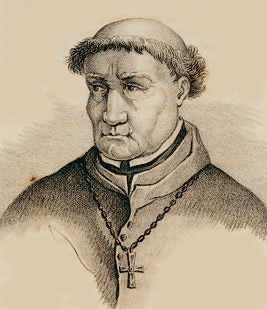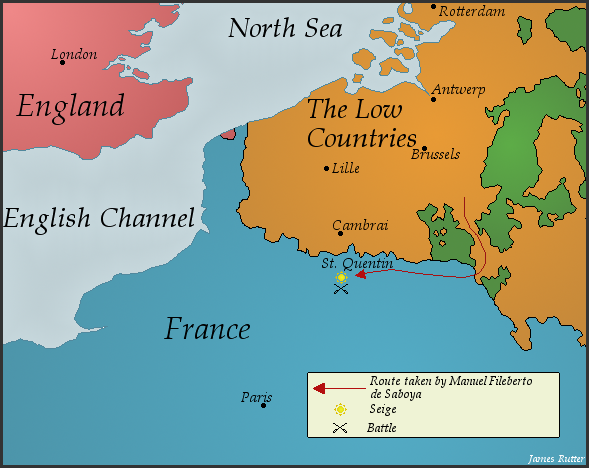|
Matthieu Ory
Matthieu Ory (1492 at Caulnes – 1557 at Paris) was a French Dominican theologian and Inquisitor. Life Entering the Dominican Order at the age of eighteen, he studied in the convent of St-Jacques, Paris, and at the Sorbonne, obtaining the licentiate in theology, 6 February 1527. His reputation for learning and eloquence led to his appointment as grand inquisitor for France (1534), an office which he held until his death. Compelled to pronounce upon false accusations made against Ignatius Loyola and "The Spiritual", he detected the fraud. Instead of condemning Loyola, he praised and assisted him, and kept for himself a copy of the ''Exercises''. He was indefatigable in preaching, and held several offices in his order. Some writers erroneously call Ory a Spaniard and write his name Ortiz. Works The only fully authenticated printed work of Ory is his "Alexipharmacum" (Paris, 1544; Venice, 1551–58). In the second part he uses against the heretics five words of St. Paul, viz. ... [...More Info...] [...Related Items...] OR: [Wikipedia] [Google] [Baidu] |
Caulnes
Caulnes (; ; Gallo: ''Caunn'') is a commune in the Côtes-d'Armor department of Brittany in northwestern France. Geography Climate Caulnes has a oceanic climate (Köppen climate classification ''Cfb''). The average annual temperature in Caulnes is . The average annual rainfall is with November as the wettest month. The temperatures are highest on average in August, at around , and lowest in January, at around . The highest temperature ever recorded in Caulnes was on 5 August 2003; the coldest temperature ever recorded was on 2 January 1997. Population Inhabitants of Caulnes are called ''Caulnais'' in French. See also *Communes of the Côtes-d'Armor department The following is a list of the 348 communes of the Côtes-d'Armor department of France. The communes cooperate in the following intercommunalities (as of 2020): [...More Info...] [...Related Items...] OR: [Wikipedia] [Google] [Baidu] |
Dominican Order
The Order of Preachers ( la, Ordo Praedicatorum) abbreviated OP, also known as the Dominicans, is a Catholic mendicant order of Pontifical Right for men founded in Toulouse, France, by the Spanish priest, saint and mystic Dominic of Caleruega. It was approved by Pope Honorius III via the papal bull '' Religiosam vitam'' on 22 December 1216. Members of the order, who are referred to as ''Dominicans'', generally carry the letters ''OP'' after their names, standing for ''Ordinis Praedicatorum'', meaning ''of the Order of Preachers''. Membership in the order includes friars, nuns, active sisters, and lay or secular Dominicans (formerly known as tertiaries). More recently there has been a growing number of associates of the religious sisters who are unrelated to the tertiaries. Founded to preach the Gospel and to oppose heresy, the teaching activity of the order and its scholastic organisation placed the Preachers in the forefront of the intellectual life of the M ... [...More Info...] [...Related Items...] OR: [Wikipedia] [Google] [Baidu] |
University Of Paris
The University of Paris (french: link=no, Université de Paris), Metonymy, metonymically known as the Sorbonne (), was the leading university in Paris, France, active from 1150 to 1970, with the exception between 1793 and 1806 under the French Revolution. Emerging around 1150 as a corporation associated with the cathedral school of Notre Dame de Paris, it was considered the List of medieval universities, second-oldest university in Europe.Charles Homer Haskins, Haskins, C. H.: ''The Rise of Universities'', Henry Holt and Company, 1923, p. 292. Officially chartered in 1200 by King Philip II of France and recognised in 1215 by Pope Innocent III, it was later often nicknamed after its theological College of Sorbonne, in turn founded by Robert de Sorbon and chartered by List of French monarchs, French King Louis IX, Saint Louis around 1257. Internationally highly reputed for its academic performance in the humanities ever since the Middle Ages – notably in theology and philosophy – ... [...More Info...] [...Related Items...] OR: [Wikipedia] [Google] [Baidu] |
Grand Inquisitor
Grand Inquisitor ( la, Inquisitor Generalis, literally ''Inquisitor General'' or ''General Inquisitor'') was the lead official of the Inquisition. The title usually refers to the chief inquisitor of the Spanish Inquisition, even after the reunification of the inquisitions. Secretaries-general of the Roman Inquisition were often styled as ''Grand Inquisitor'' but the role and functions were different. The Portuguese Inquisition was headed by a Grand Inquisitor, or General Inquisitor, named by the Pope The pope ( la, papa, from el, πάππας, translit=pappas, 'father'), also known as supreme pontiff ( or ), Roman pontiff () or sovereign pontiff, is the bishop of Rome (or historically the patriarch of Rome), head of the worldwide Cathol ... but selected by the king, always from within the royal family. The most famous Inquisitor General was the Spanish Dominican Tomás de Torquemada, who spearheaded the Spanish Inquisition. List of Spanish Grand Inquisitors S ... [...More Info...] [...Related Items...] OR: [Wikipedia] [Google] [Baidu] |
Ignatius Loyola
Ignatius of Loyola, S.J. (born Íñigo López de Oñaz y Loyola; eu, Ignazio Loiolakoa; es, Ignacio de Loyola; la, Ignatius de Loyola; – 31 July 1556), venerated as Saint Ignatius of Loyola, was a Spanish Catholic priest and theologian, who, with Peter Faber and Francis Xavier, founded the religious order of the Society of Jesus (The Jesuits), and became its first Superior General, in Paris in 1541. He envisioned the purpose of the Society of Jesus to be missionary work and teaching. In addition to the vows of chastity, obedience and poverty of other religious orders in the church, Loyola instituted a fourth vow for Jesuits of obedience to the Pope, to engage in projects ordained by the pontiff. Jesuits were instrumental in leading the Counter-Reformation. As a former soldier, Ignatius paid particular attention to the spiritual formation of his recruits and recorded his method in the '' Spiritual Exercises'' (1548). In time, the method has become known as Ignatian spir ... [...More Info...] [...Related Items...] OR: [Wikipedia] [Google] [Baidu] |
Jacques Échard
Jacques Échard (22 September 1644, in Rouen – 15 March 1724, in Paris) was a French Dominican and historian of the order. As the son of a wealthy official of the king he received a thorough classical and secular education. He entered the Dominican Order at Paris and distinguished himself for his assiduity in study. When Jacques Quétif, who had planned and gathered nearly one-fourth of the material for a literary history of the Dominican Order, died in 1698, Échard was commissioned to complete the work. After much labour and extensive research in most European libraries this monumental history appeared in two quarto volumes, under the title ''Scriptores ordinis prædicatorum recensiti, notisque historicis illustrati ad annum 1700 auctoribus.'' (Paris, 1721). There was a reprint: New York: Burt Franklin, 1959-61. Besides a sketch, based chiefly on Pignon and Salanac, and a list of each writer's works, with dates and peculiarities of the various editions, Échard enumerates the ... [...More Info...] [...Related Items...] OR: [Wikipedia] [Google] [Baidu] |
Sixtus Senensis
Sixtus of Siena (or Sixtus Senensis) (1520–1569) was a Jew who converted to Roman Catholicism, and became a Roman Catholic theologian. Biography He began his career as a Franciscan preacher, speaking throughout Italy. Though he was convicted to die in Rome for the crime of heresy or recidivism, he was saved by a Dominican inquisitor, the future Pope Pius V, who repealed the condemnation when Sixtus recanted and pledged to transfer to the Dominican Order instead. He is considered one of the two most outstanding Dominican scholars of his generation. He had as a master Lancelotto Politi, some of whose writings he later publicly criticised. Sixtus apparently destroyed all his remaining manuscripts and writings before his death. Sixtus coined the term '' deuterocanonical'' to describe certain books of the Catholic Old Testament The Old Testament (often abbreviated OT) is the first division of the Christian biblical canon, which is based primarily upon the 24 books of ... [...More Info...] [...Related Items...] OR: [Wikipedia] [Google] [Baidu] |
Niccolò Orlandini
Niccolò Orlandini (April 10, 1553 – May 17, 1606) was an Italian Jesuit author. Biography He was born at Florence in 1553. He entered the Jesuit novitiate in November 7, 1572, became rector of the Jesuit college at Nola and was master of novices at Naples for five years. He was finally appointed secretary of the Jesuit general Claudio Acquaviva Claudio Acquaviva, SJ (14 September 1543 – 31 January 1615) was an Italian Jesuit priest. Elected in 1581 as the fifth Superior General of the Society of Jesus, he has been referred to as the second founder of the Jesuit order. Early life an ..., who in 1558 detailed him to write the history of the Jesuit Order, his master piece. He died in Rome in 1606. Works His history of the Jesuit Order comprises only the generalate of St. Ignatius. It was edited by Sacchini, and appeared under the title "Historiæ Societatis Jesu prima pars" (Rome, 1614, 1615, 1621; Antwerp, 1620; Cologne, 1620). It is written in the form of annals an ... [...More Info...] [...Related Items...] OR: [Wikipedia] [Google] [Baidu] |
1492 Births
149 may refer to: * 149 (number), a natural number * AD 149, a year in the 2nd century AD * 149 BC, a year in the 2nd century BC * British Airways Flight 149, a flight from LHR to Kuwait City International Airport; the aircraft flying this flight was destroyed by Iraqi troops See also * List of highways numbered 149 * {{Number disambiguation ... [...More Info...] [...Related Items...] OR: [Wikipedia] [Google] [Baidu] |
1557 Deaths
__NOTOC__ Year 1557 ( MDLVII) was a common year starting on Friday (link will display the full calendar) of the Julian calendar. Events January–June * March – The Takeda clan besiege Katsurayama Castle in eastern Japan. The siege ends with the last stand of the castle garrison, and the complete destruction of Katsurayama, allowing the Takeda to further expand in Shinano Province. * April 12 – The Spanish settlement of Cuenca, Ecuador, is founded. * April 30 – Arauco War – Battle of Mataquito: Spanish forces of Governor Francisco de Villagra launch a dawn surprise attack against the Mapuche (headed by their toqui Lautaro), in present-day Chile. * By June – The 1557 influenza pandemic has spread, probably from China, to Europe. * June 7 – Mary I of England joins her husband Philip II of Spain, in his war against France. * June 10 – The New Testament of the Geneva Bible, a Protestant Bible translation into En ... [...More Info...] [...Related Items...] OR: [Wikipedia] [Google] [Baidu] |





